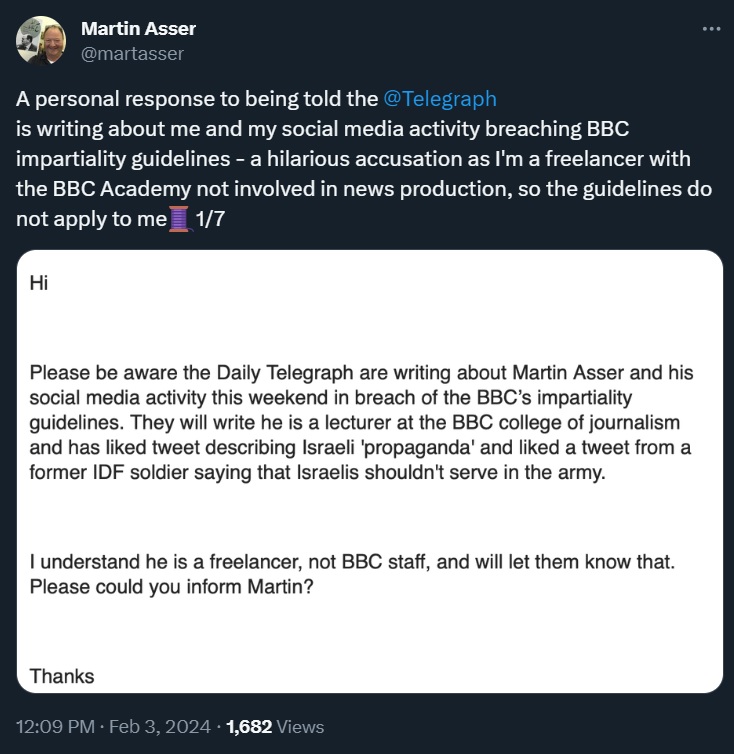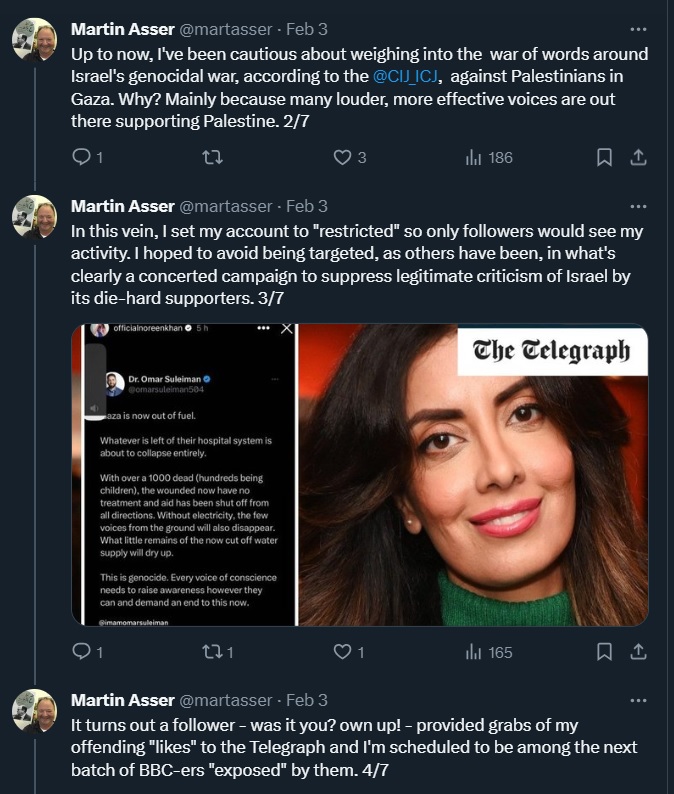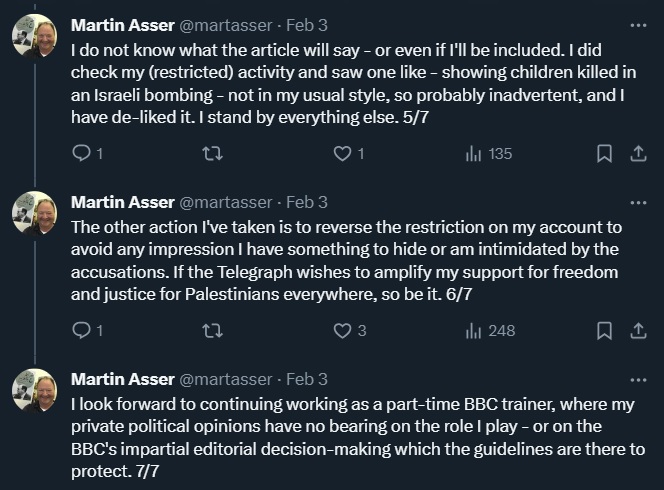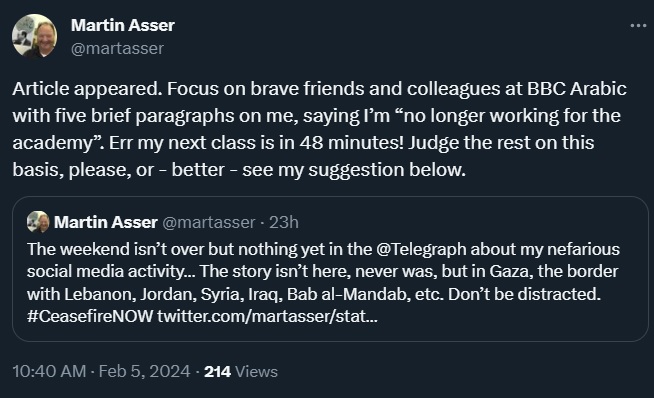On February 4th the Telegraph published a report by Henry Bodkin headlined ‘BBC journalists ‘liked’ anti-Semitic tweets despite promise to crack down on bias’ in which readers are told that:
“One reporter based in Egypt liked a tweet in December making unsubstantiated allegations that large numbers of Jews from around the world are buying up land in Northern Cyprus, with the aim being “to seize” the territory for Israel.
The story, propagated in part by some Turkish newspapers, has prompted alarm on the island in recent months, despite officials disputing the numbers.
The same BBC Arabic service journalist, Sally Nabil, liked a tweet endorsing the words of a released Israeli hostage who expressed her “deepest gratitude” to Hamas for her treatment.
Along with several colleagues, Ms Nabil was exposed by The Telegraph in October for liking a comment to a video showing trucks loaded with dead Israelis and kidnapped civilians on October 7.
BBC bosses subsequently said they were “urgently investigating”, but they have not said what disciplinary action was taken.”
English language reports by Sally Nabil which remain accessible to users of the BBC News website include a whitewashing of the reasons why Jews left Egypt:
BBC WHITEWASHES 20TH CENTURY JEWISH EMIGRATION FROM EGYPT
The Telegraph’s report continues:
“The Telegraph can also reveal that a trainer at the BBC Academy is also facing allegations of bias.
Martin Asser liked a tweet quoting a former Israeli soldier saying the Israel Defense Forces “should not exist”.
He also liked a tweet suggesting that Israel had “trained” Western opinion to view them as “just a bunch of little angels”.
Mr Asser was commissioned in December to write an analysis on the BBC Arabic website about the possibilities of a two-state solution to the conflict.
The BBC said he was no longer working for the academy and that his involvement had been in technical training.”
Martin Asser posted a response on Twitter before the Telegraph’s report appeared.

The BBC’s Guidance on Personal Use of Social Media states: [emphasis added]
“Everyone who works for the BBC should ensure their activity on social media platforms does not compromise the perception of or undermine the impartiality and reputation of the BBC, nor their own professional impartiality or reputation and/or otherwise undermine trust in the BBC.
-
- a) Individuals working in news and current affairs (across all divisions) and factual journalism production, along with all senior leaders have a particular responsibility to uphold the BBC’s impartiality through their actions on social media and so must abide by specific rules set out in this guidance. Factual journalism includes returning strands which cover topical issues. Some individual documentaries may also qualify as factual journalism.
- b) Those presenting Flagship Programmes on the BBC carry a particular responsibility to help to balance commitments to both freedom of expression and impartiality, because of their profile on the BBC. This responsibility extends to their use of social media, both for professional and for personal use, during the periods when these Flagship Programmes are on air, and for a two-week window before and after the series. […]
- c) All other BBC staff or freelancers are not required to uphold the BBC’s impartiality through their actions on social media. They are however required to respect civility in public discourse and must not bring the BBC into disrepute.” [emphasis added]
Asser’s thread continued with promotion of the notions of ‘genocide’ and a ‘suppression of criticism’:


Asser produced subsequent posts before and after the article’s publication.


In addition to the fact that, despite the statement given to the Telegraph by the BBC, Asser apparently continues to do work for the corporation and is therefore under obligation not to “bring the BBC into disrepute” or compromise his own “professional impartiality or reputation”, his social media activity is relevant because no small amount of content he produced when he was a full-time employee is still accessible online.
Asser’s claim concerning “Israel’s genocidal war”, his promotion of the notion of “a concerted campaign to suppress legitimate criticism of Israel by its die-hard supporters” and his self-declared “support for freedom and justice for Palestinians everywhere” put a fresh perspective on that BBC content, which includes a series of supposedly factual backgrounders:
BBC’S “OBSTACLES TO PEACE” DO NOT HOLD WATER – PART 1
BBC’S “OBSTACLES TO PEACE” DO NOT HOLD WATER – PART 2
BBC’S ‘OBSTACLES TO PEACE’: WRONG ON RIGHT OF RETURN – PART 1
BBC’S ‘OBSTACLES TO PEACE’: WRONG ON RIGHT OF RETURN – PART 2
BBC’S “OBSTACLES TO PEACE” ERASES PRE-1967 JEWISH HISTORY IN JERUSALEM
BBC’S “OBSTACLES TO PEACE”: A BARRIER TO UNDERSTANDING ISRAEL’S BORDERS
The BBC’s funding public might of course have assumed that people who “work as a part-time BBC trainer” would display rather more commitment to the thorny topic of BBC impartiality, not least due to the potential effects on the quality of content produced by future generations of BBC journalists.






The IBC, erm sorry BBC are happy to let people abuse their rules on social media, it serves their purpose of castigating Israel and venting their antisemitic spleens. At least the change of leadership at the BBC has demonstrated his intent by the sacking of Dawn Queva, but I wonder just how many more DQs are hiding in the bowels of the BBC cesspit #defundthebbc